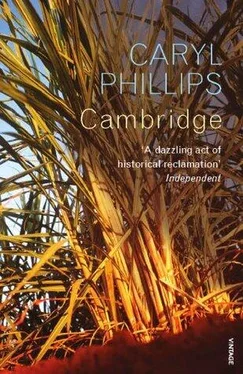Caryl Phillips - Cambridge
Здесь есть возможность читать онлайн «Caryl Phillips - Cambridge» весь текст электронной книги совершенно бесплатно (целиком полную версию без сокращений). В некоторых случаях можно слушать аудио, скачать через торрент в формате fb2 и присутствует краткое содержание. Год выпуска: 2009, Издательство: Vintage Digital, Жанр: Современная проза, на английском языке. Описание произведения, (предисловие) а так же отзывы посетителей доступны на портале библиотеки ЛибКат.
- Название:Cambridge
- Автор:
- Издательство:Vintage Digital
- Жанр:
- Год:2009
- ISBN:нет данных
- Рейтинг книги:5 / 5. Голосов: 1
-
Избранное:Добавить в избранное
- Отзывы:
-
Ваша оценка:
- 100
- 1
- 2
- 3
- 4
- 5
Cambridge: краткое содержание, описание и аннотация
Предлагаем к чтению аннотацию, описание, краткое содержание или предисловие (зависит от того, что написал сам автор книги «Cambridge»). Если вы не нашли необходимую информацию о книге — напишите в комментариях, мы постараемся отыскать её.
Cambridge — читать онлайн бесплатно полную книгу (весь текст) целиком
Ниже представлен текст книги, разбитый по страницам. Система сохранения места последней прочитанной страницы, позволяет с удобством читать онлайн бесплатно книгу «Cambridge», без необходимости каждый раз заново искать на чём Вы остановились. Поставьте закладку, и сможете в любой момент перейти на страницу, на которой закончили чтение.
Интервал:
Закладка:
The main island road described a route along the very margin of the sea. In some parts the waves broke in such a manner that they must regularly dampen the feet of those who choose to make their explorations upon two legs. At regular intervals we passed through a cluster of houses lacking any outward colouring, except that which they had acquired from exposure to the elements. These villages (for it would appear that this is what they were) boasted the most simple names, such as Butler's, Halfway House, Middle Way, etc. Although, at least to my untrained eye, these rickety structures did not appear to constitute pleasant residences, they were all positioned so that through each individual door-frame, and above every bamboo and palm-leaf fence, a beautiful sea-view was obtained.
The roughness of the road caused me a little discomfort, a sensation with which I was not altogether unfamiliar having survived my first (and I hope my last) tempest. I marvelled at the riches of the fields and thickly wooded passes to my right, and noted that the fields were divided into cane-pieces by different species of hedge, some of which to the eye alone appeared to be prickly, and in this respect I imagined would resemble our hawthorn. These West Indian fields were all neatly dressed as though preparing for turnip husbandry as practised in England. At every turn a pretty prospect attracted the eye, and these visions were made more cheerful by batches of negroes of every age and description returning from Baytown with baskets and trays and boxes atop their black mossy crowns. The critical position of these receptacles seemed not to hinder their rolling gait, nor interrupt their chatter and song. They smiled and curtseyed as we passed them by. Some chose to bestow upon us a respectful, 'How you do, missis? How you do, massa?' to which we nodded a silent reply, by which they were meant to understand that we were perfectly well, thank you.
Just after we turned off the island road, and into a small ascending lane, a number of pigs bolted into view, and after them a small parcel of monkeys. This took me by surprise, and I must have jumped some considerable space, for the gentleman took my arm as though to steady me and prevent my falling from the carriage. However, on resettling my position, I discovered that what I had taken for monkeys were nothing other than negro children, naked as they were born, parading in a feral manner to which they were not only accustomed, but in which they felt comfortable. I expressed my general concern at the blackness of the native people and was corrected on one count and instructed on the other.
The blacks are not, it would appear, considered to be native people. They were, as is commonly known, imported from Africa to help ease our labour problem, and have continued to breed in these climes. Their migration to these shores means they cannot be recognized as true natives. In this same manner one cannot consider the white people native for they are here on a civilizing and economic mission. The gentleman informed me, in a short but edifying lecture, that the true natives of this region were of an Indian origin (hence the name 'West Indies'). Sadly they were discovered to be too troublesome and unused to European ways and had to be dispatched. However, this proved no simple task for, according to their savage customs, these Carib Indians armed themselves with clubs and sharp spears whose ends were decorated with poisonous fish bones. The character of these Carib Indians might best be described as fierce, superstitious and vengeful, ready to vent their anger on any and everything, animate or inanimate. Their fury bore more semblance to the wild irrationality of the lion than to the passionate intensity of man. Accustomed to being absolute masters of their own conduct, they scorned to follow orders, and displayed an implacable opposition to correction. Content merely to roam their native territory, this led naturally to the undernourishment of their powers of reasoning, and the limited development of their intellects. Presented with the improvements of civilized life they responded with apathy, continuing in that most base of all practices, the plumping of their fellow Indians for the purposes of consumption during their grand feasts. Happy for us that Paganism, with all its accompanying horrors, has now given way to a milder doctrine which has freed this land of the soul-sickening human feasting with which the original natives once polluted it.
Having been corrected on the count of native peoples, I was now instructed on the question of colour. It appears that there are many shades of black, some of which signify a greater social acceptability man others. My host informed me that there were other persons who could give fuller and more authoritative instruction in this matter, but generally speaking the lighter the shade of black, the nearer to salvation and acceptability was the negro. A milkier hue signified some form of white blood, and it should be clear to even the most egalitarian observer that the more white blood flowing in a person's veins, the less barbarous will be his social tendencies.
I asked after Mr Wilson, the manager of the estate and the man to whom my father had written informing him of my impending arrival, but the gentleman seemed unable to give me a clear and acceptable answer on this topic. He informed me that his status was that of book-keeper, doing so as though to plead with me that I was pressing him to stray into territory beyond his station. Knowing that my curiosity would soon be satisfied I refrained from this line of questioning and resumed the pleasant pastime of looking about myself and hoping to observe, albeit at a distance, new varieties of wild animal. But it was now that my fellow-passenger took it upon himself to broach the subject of my servant, or rather my lack of a servant. He asked of me if I was in the habit of travelling alone, careful to point out that unfettered travel can have its advantages, although he indicated that in these parts it is considered a little strange to see a lady abroad without her attendant or attendants. I suffered his polite enquiries and observations before replying as gently as possible, in order that I might spare his modesty, that my Isabella had been taken ill upon the seas and breath having fled her body she was cast upon the waters. His now flowering face and helpless stammer indicated to me the depths of his shame. I placed one hand upon his to assure him that I did not hold him in any way responsible for his blundering upon the unfortunate cause of my solitude. However, it appeared he was not to be consoled, and we passed the remaining phase of our journey without speech.
I had been led to believe that planters' residences were imposing structures which stood, if at all possible, in commanding positions to reflect the status of the person housed within. This edifice was certainly no exception. We gradually neared the end of a short and steep ascent and turned off from this treacherous path into an avenue of cedars and palmettoes. Just visible at the end of this Arcadian grove, built of wood and stone, and standing clear of the ground on broad flinty supports, was the Great House that my father could, were he to avail himself of the time, and suffer a trifle inconvenience, claim to call his own home.
The negro driver drew the carriage to a halt in a wide and somewhat ostentatious semi-circle that had the good fortune to deposit me at the foot of the sharply chiselled steps. These led up to the main entrance of this tropical palace. It somewhat disturbed my person to see no evidence of Mr Wilson. Indeed, there were no men of any description to greet me, save black servants who were all poorly clothed, horribly dirty, and had about their manner a lazy carelessness. They sauntered into view from all directions, and formed some variety of welcoming party. Both the negro men and the negro women appeared to be presided over by a jet woman, who stood central to this activity in a clean white dress with her arms folded across a generous bosom. She held herself as though the mistress, and stepped gaily down towards me with a delicacy which mocked her immodest proportions. She curtseyed in a charming manner, jabbered something to the driver, and then pointed to the old woman who stood upon the backplate of the carriage. I had forgotten about this woman's presence and had spoken freely and without due regard for a servant's large ears. Quickly casting my mind back over the breadth and range of my conversation, I decided that I had revealed nothing of import and felt greatly relieved by this discovery.
Читать дальшеИнтервал:
Закладка:
Похожие книги на «Cambridge»
Представляем Вашему вниманию похожие книги на «Cambridge» списком для выбора. Мы отобрали схожую по названию и смыслу литературу в надежде предоставить читателям больше вариантов отыскать новые, интересные, ещё непрочитанные произведения.
Обсуждение, отзывы о книге «Cambridge» и просто собственные мнения читателей. Оставьте ваши комментарии, напишите, что Вы думаете о произведении, его смысле или главных героях. Укажите что конкретно понравилось, а что нет, и почему Вы так считаете.












